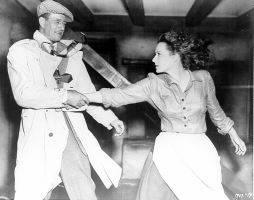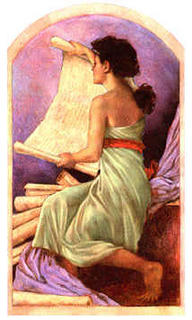
This scene comes from one of my favorite movies,
The Quiet Man. The leading man and lady fall madly in love, but then have more than a few issues to work out after the marriage. Thoughtful consideration of how we, as women, can serve the Lord best in marriage is essential if we desire to avoid the tension displayed in this picture.
So what is our active role in marriage? It is often said that our role in marriage is to submit, but while submission is a vital part of the marriage dynamic, I do not believe it accurately encompasses the whole of what the bible teaches on the role of a wife. Sharon James in her book,
God's Design For Women, comments on the wide sphere of activity pursued by the well-known Proverbs 31 wife:
It would be silly to say that her role was to submit. Her primary calling was to love and nurture her husband and children, but she also had a wide sphere of benevolent and economic influence. We see that she gladly affirmed her husband as leader in the family and community, in that she took the burden of managing the household and estate so that he could play his part as a community leader ('at the gate'). So you could say rather that her response to her husband was one of submission (saying 'yes' to his leadership).We know that the bible clearly teaches the importance of submitting to our husband and affirming his leadership, but it seems more accurate to say our primary role in marriage is to
help our husband. And I believe there is much more satisfaction and fulfillment in doing this than Christian women are generally led to believe.
We read in Genesis 2:18, "The Lord God said, 'It is not good for the man to be alone. I will make a helper suitable for him." A 'helper' is not a degrading role. Men actually need our help (just as we need their leadership.) We are to be a companion to them, to help and strengthen them. The Proverbs 31 woman "brings [her husband] good, not harm," and he "has full confidence in her." (vv.11-12) It's interesting to note that this woman does pursue business and activities that are outside of the home, but everything she does 'helps' and works toward the good of her husband, children and household.
One of the best ways we can help our husband is to take care of the details of running the household in order to free him up to pursue his calling and ministry. An example of marriage that I find inspiring is that of Jonathan Edwards (an 18th century pastor and theologian) and his wife Sarah. When reading about her, I am always struck by how she does everything she can to promote her husband's usefulness and happiness. Apparently, she took care of their property and gave the hired man instructions for the day. Elizabeth Dodds in her book entitled
Marriage to a Difficult Man, the "Uncommon Union" of Jonathan and Sarah Edwards says, "They used to tell in Northampton [their home town] how once Edwards asked, 'Isn't it about time the hay was cut?' To which Sarah mildly replied, 'It's been in the barn for two weeks.'"
One thing I'm learning is that we cannot expect recognition for all our work in the home because our efforts often go unseen and unappreciated in the moment. But there can be great satisfaction in knowing God's pleasure in our obedience, and in knowing that we are fulfilling God's calling in a way that has lasting value. This is what we need to remember when the world tells us that what we are doing is irrelevant and unimportant.







